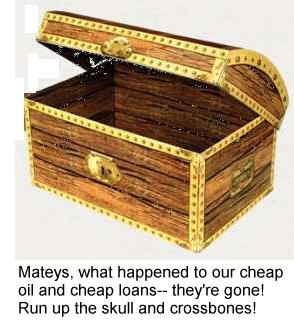

|
| weblog/wEssays archives | home | |
|
A Whiff of Apocalypse (July 18, 2006)  Napoleon famously cleared a mob of protesters in Paris with a "whiff of grapeshot," a
peculiarly innocuous-sounding reference to a murderously effective cannonade of shells
filled with hundreds of musket balls-- a giant shotgun, if you will, whose massed
bullets inspired the breezy reference to clusters of grapes.
Napoleon famously cleared a mob of protesters in Paris with a "whiff of grapeshot," a
peculiarly innocuous-sounding reference to a murderously effective cannonade of shells
filled with hundreds of musket balls-- a giant shotgun, if you will, whose massed
bullets inspired the breezy reference to clusters of grapes.
With Lebanon in flames, Israel under relentless missile attack, commuter trains bombed in Bombay, Iran's naked ambition for nuclear weapons finally reaching the airless heights of the U.N. Security Council for another round of flailing inaction, and oil nearing $80/barrel--it's difficult not to sense a whiff of Apocalypse in the air. The financial punditry are saying ho hum, another Mideast crisis, no big deal; the stock market ignores Mideast crises, so what do we really care? Unless, of course, oil is involved. Then all bets are off. Those of us with long memories recall that the last two great recessions just happened to occur right after open warfare in the Mideast (the 1973 Yom Kippur War) or the Iranians launching a crisis (the American hostages, 1980). Hmm...isn't there basically an open war between Hezbollah (proxies of Syria and Iran) and Israel going on right now? And aren't the Iranians staging another crisis with their transparent plans to enrich uranium to weapons-grade levels? (And their equally transparent strategy of stalling the West with phony "negotiations" until the bombs are in hand, or placed on top of North Korean-designed missiles capable of reaching Tel Aviv or, say, Rome?) And something else is different this time: the global economy is balanced on a tottering house of cards: costly oil (currently $78, up from $17 in 2001), a deflating housing bubble, a veritable mountain of debt, and a tightening of global money. Could a whiff of apocalypse bring the global house of financial cards down? As noted here before (Are We Poised on the Precipice of Another Age of Turmoil?), the Kondratieff cycle suggests a global recession/depression will begin soon and bottom around 2011 or 2012. The current conflicts (and the precariousness of oil supplies) certainly provide the backdrop for such a cycle of decline and debt repudiation. Before accepting the pundits' warm assurances that the stock market is going to be just peachy, perhaps you should first ask these questions: Why would Iran relinquish its quest for nuclear weapons now, when it's so close to acheiving that wondrous goal? Pakistan, after all, got away with it; why not Iran? Pundits claim Iran would give up nuclear ambitions for a trade pact (or equivalent); oh really? Give up the most important geopolitical leverage on the planet for a lousy trade agreement? Don't hold your breath. Why would Israel sit idly by until Iran gets the Bomb, after Iran has openly announced its desire to nuke Israel? If you were in the Israelis' shoes, would you cavalierly dismiss the statements of Iran's president as mere "playing to the crowd"? What if you're wrong, and he's serious? Wouldn't it be safer to risk a conventional war with Iran now rather than risk a nuclear one later? (Note: leaders of both India and Pakistan have been quoted as believing their nation would survive a nuclear exchange. Why wouldn't Iran's leaders share that same sublimely misplaced confidence?) What if Israel's patience with Syrian and Iranian support of Hezbollah has finally reached a limit? (Ditto for India's patience with Pakistan's claims that it can do nothing to stop the Islamic terrorists blowing up trains in India. Recall that Islamic terrorists stormed the Indian Congress in 2001; if Pakistani-supported terrorists stormed the U.S. Congress, what do you imagine our response would be? Restraint? And what exactly would such noble restraint get us? What has it reaped for the Indians, other than more terror attacks on civilians?) It's worth recalling, too, the prediction of anthropologist Desmond Morris, author of The Naked Ape, that the U.S. would lose the war in Vietnam for the gene-based reason that attacking hominids don't fight with the same back-against-the-wall, defending- the-Homeland ferocity as the defenders. Invaders lose, defenders win (Generally. Napoleon and Hitler proved otherwise until they took on Russia). So whose back is truly against the wall? Will Syrian fighter pilots have the same must-win motivation as Israeli pilots, should war break out? Is the existence of Syria really in doubt in such a war? It's a question worth pondering when both sides in an open-ended conflict claim they will never back down. Given the above questions, why would the price of oil decline from $80? Why wouldn't it climb to $100, especially as hurricane season approaches in the Gulf of Mexico? And if the cost of oil keeps climbing, at what point will it be high enough to tip the global economy into recession? Is anyone ready to claim there is no upper limit to what the world can afford, or that conditions are not ripe for a run up to whatever that limit might be? Exactly what would support such confidence? A foolhardy desire to prop up the global stock markets, perhaps? Just keep watching the smart money selling, and I think you'll have your answer. The four-year cycle predicts a major low in October 2006, and the whiff of Apocalypse in the air may well knock down the trembling house of cards--right on schedule. For more on this subject and a wide array of other topics, please visit my weblog. copyright © 2006 Charles Hugh Smith. All rights reserved in all media. I would be honored if you linked this wEssay to your site, or printed a copy for your own use. |
||
| weblog/wEssays | home |